



Government
 4.0.07
4.0.07 
a naïve perspective
Individual and society
A solitary (nowadays "independent" or "off-grid") human being has to cover all his specific production and consumption needs. Hunt, kill, process the flesh, cook it, deal with waste and excess as much as the secondary materials like fur and leather. He has to gather fruits and seeds, spin the threads, weave, sew clothes, repair them, wash them. He has to create his own tools, maintain them. If he wants to improve his life conditions, he needs to invent mechanisms, manufacture specific components, gain expertise in all the related areas, construct and operate them. He has to be his own teacher, artist or spiritual shepherd.
Everything else - from wheel to smartphones - was devised thanks to human specializing. Individuals focus on what they are best in - as broadly described by counter-intuitive "comparative advantage". Two contradictory phenomena enter the play - competition, which in theory ensures incentive, efficiency (no wasting), constant improvements, overal progress of the whole community - and cooperation, which represents the sense of togetherness, fairness, mutual care and support, creating large public projects, sharing of the benefits of the diversified society, in the best case a synergy of knowledge and skills. Both to some extent bring all these specialists together, to trade with their potential, aligning all the specific pieces of the mosaic in sensible way.
Coordination of these specialists, setting the sensible limits, balancing the contradictory needs - is a task itself. Indeed, a full-time job. Most suitable character can be chosen to this position - although by specialists from completely different areas, somewhat unskilled to evaluate his fitness for this enterprise. Since he sets guidelines - rules and fines - he needs to acquire respect that they will be followed. A caste of other specialits is called: the implementors of the law. Nowdays police, judges, janitors. A very similarly empowered guild - soldiers - protects the community from the outside threats.
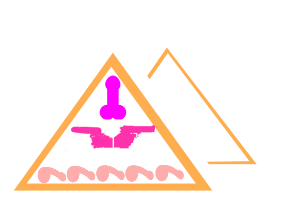
The times of Pyramids, feudalism, or modern totalitarians:
The Big One rules, the cocky ones harass, the rest obeys.
Hierarchy - the chosen ones and the commoners
How to pass the coordinator function? A bunch of laics can guess the best ruler and elect him as the previous one dies, or even in regular intervals. The other option is that the proven governor uses his specific sense for governing and chooses himself the successor. His perspective is expertly, but in the same time dangerously subjective. He is an individual himself, with particular taste, preferences, values. The biological programming enters the game - he is a parent who promotes the survival and comfort of his own offsprings. Hereditary dynasties are born, regardless of the fluctuating intelligence of the lineage. Straight parental instinct, selfish and selective as it is, shaped and deformed most of human history.
In order that one king - with excessive (unearned) possessions and lifestyle - might command overwhelming crowd of fiefs that are living in quite miserable conditions at the edge of survival (which is desirable, there’s no time to think of monarch’s wealth or a way to revolt), he needs a middle man with sufficient enforcement power. They get better shares, higher lifestyle, exemptions from rules - in return for obedience and service in this top-down system. They only are entitled to hold the state-of-the-art weapons, in order to be able to subdue the majority.
The caste of thugs - the absolutely crucial element of any regime that takes over, even if often barely under control - reflects the personality of certain portion of society. They cannot cultivate, craft or create, think or coordinate - their only skill is to take. A brute force. Using this tool, they claim their place in the ecosystem. The thugs - aggressive and armed - change the regimes if there is more to take. Often, they are not just mercenaries hired by aristocracy (or whatever is the name of the day), but install their alpha by themselves, often the measure of worthiness is their own: the strength.
There is an idealist claim, that hierarchies are natural - they just reflect the inborn tallent, an effort measured by achieved expertise and admiration within certain circle. Hierarchies don’t exist only on state level, they are present within guilds, enterprises, groups of friends. Those on top deserve to be there, because they climb up in fair competition, creating their own merit. This perfect world may be more reminiscent of reality in small scale. However, how do the different expertises compare - and clash - in interdisciplinary sense? Proven by thousands historical cases - the brute force of armed thugs always wins.
There is a supporting case for the feudal model. If the ruler is enlightened and grasps the theater of the society - everyone is on his best fitting place, contributing into the whole, moving the complex machine forward, getting his tempting-enough share - and his role as the coordinator, inspiring symbol, protector, provider of the sense of direction, visionary - everyone feels better off. Everyone’s secure at their place, there is a stability. The choice of ruler is so absurd matter of hereditary chance - that in some sense it silences all the squabbles about who should be the chosen one living in luxury. In this line of thinking, it is just given. No arguments about who is the better, or if to go left or right. Lottery is often a choice in disputes.
If the brutal power is not frightening enough, if the loss of stability does not seem ominous, if the point of hierarchy is not obvious - there is always a God, another synonym of randomness of chance, natural development of events, or hard to calculate results of multi-variable equations. God punishes and rewards, God gives talents, God chooses who’s born into royal lineage. God wants the things this way. The king is the deputy of God. Very simple circular thinking trap.
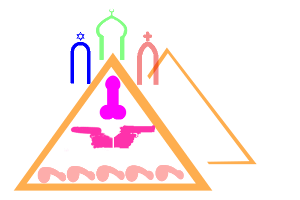
It has all come from the Great Dicks above.
At least those dicks below say so.
If the pyramid of society as a whole progresses - technologically, intellectually - both those blow and those above benefit. If folks are healthier, ruler is less endangered by epidemy. If someone devises a new tool, king gains a toy in his treasury, but there’s much more benefit for him if the commoners start to use the tool and produce more or better goods. It’s in their mutual benefit. Unfortunately as a side-effect, the society gets more complex, diversified, specialized, intellect and capability does not follow the established hierarchy - a dangerous potential of thinkers and dissenters develops in the middle. They question the whole system: the hierarchy, the king, the God.
Revolt - the ideologues and implementors
Discrepancy in luxury, sanctity, or intellect causes rebelion. The usal treat is - more equal distribution of resources, power, liberties, responsibilities, means of production or exchange. Some republics came into being in natural way (Hanseatic league), some were established as an experiment by settlers in a new territory (Iceland, USA), some formed under the threat of overtaking (Switzerland), some had followed revolutionary way (Commonwealth, France, USSR). Peasants have overthrown the indulgent monarchy.
All these attempts seem to aspire to restore or install a aprliament, a democracy, a sense of fairness under the law. The revolutions are devised in thoughts - by intellectuals. Paradoxically, intellectuals do what they do - they think - and do not take arms. There is a completely different niche in between the enraged folk and the zealous thinkers - the group that implements the armed takeover - the well-known thugs. They do not wish to establish a better world, they lack imagination or intellect to envision anything. As in the good old feudal model, they foresee a special advantageous place in the new society. They do not necessarily favor and often even understand the improvement ideas presented by the intellectuals. They just need the book to smash the bad guys’ head with. Thugs like to fight, they do it for the sake of the fight, for their own absurd values - like victory, honor or glory. The idea is turned into ideology. Ideals are replaced with idols. Indeed, it is better if the intellectual fathers of the revolution die and become symbols, faces on the posters, names on the books. Since then they can be used in whatever way is convenient for the thug class. A new hiearchy was established.
Cromwells protectorate defying monarchy and creating something not that far from it. French revolution takeover by Jacobine dictatorship. Soviet avantgarde utopia twisting into cultish Stalinism. Weimar economical collapse, social chaos, postwar feeling of injustice, romantic nationalism, heroic and homoeroticism mannerbund, weird grasp on modernist social theories - all hijacked and perverted in Nazi coup d’etat. Military juntas around Latin America. Dissatisfaction with authoritarian communism in China replaced by even more brutal Cultural revolution. Iranian wide-range revolution against shah’s dictatorship kidnapped by theocrats. Failed Arab spring.
Complex in-depth analysis of who’s who is important, but often loses the point in fascination with the names, alliances and betrayals. All these milestones in history have something in common: Bad system replaced with bad system. Perhaps a well-meant idea used, abused, twisted and often overrun by thugs. A raid of aggressive males, who replace the law of reason with law of force. The history is heterosexual, masculine, macho - with women used as trophy objects and queers, intellectuals, artists, aliens and other minorities as scapegoats. History is "my genes". History is mentally underdevelopped boys who like their toys, who worship their wolfpack, who climb up the hierarchy - and their childish values conserved as "masculine". A failure to grow up, a failure to mature, a failure to evolve.
Thug is a personality - that reveals in any age. It was the bully at your school, a jock focused on building his body and winning medals (fame, attention, authority, females), the guy that picks the fight at the disco. He is a physical being that does not express with thoughts or feelings, the communication or compassion is not his domain. He works with his body, strength and if he fails to get what he wants he uses a brute force. He acts the same way in collectives, at work, in marriage, with sex partners. He is a machine that uses other things and beings as objects, tools. They are of use to him or standing in his way.
There is a long-running dilemma what to do with this portion of the society. He does not do well with free thinking (or thinking as such) and disagreement (with him) and therefore thrives in hierarchies. As following his own free will usually means indulgent selfishness, a system of ranks, obeying orders - is safer for himself, those like him and those around them who have to suffer their existence. As he does not see the bigger picture naturally, or the general ideas that form the rules, he must stricly follow the fixed set of rules - even if their application sometimes transgresses the intention behind them.
Democracy - the mob and its specimen
A hierarchy seen in a particular way - a maffia state run by thugs, a minority exploiting the majority - appears detestable. A revolt follows, once in a while resulting in a democracy. A system no more sophisticated - laics trying to determine who’s the expert, who should be deciding on behalf of everyone. A system no less hierarchical. The dominace through brutality and weapons of the thugs is replaced with the dominace through numbers and mass. If the majority is in power, if the majority is deciding, if the majority is flattered - it does not necessarily mean that the majority is better off.

Democracy: Good start with the circle. Equality.
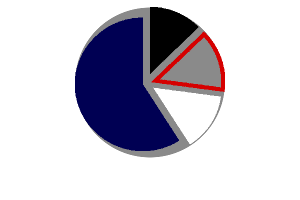
Democracy: Voting, majority and minority, coalitions.
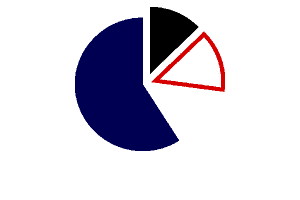
Democracy: Society divided, majority gets to decide.
As the direct democracy with so many areas of interest, fields of expertise, and in general so many members - and undeniable need for someone to do the other work that runs the economy and state - appears time-consuming, a representative democracy was devised. People choose the best among them, the best suitable for the coordinator (politician, lawmaker, judge) position - to decide for them, as a regular service in the (eco)system. Can the experts with narrow insight in their field of expertise determine who is the best coordinator - a role and a quality clearly out of their domain?
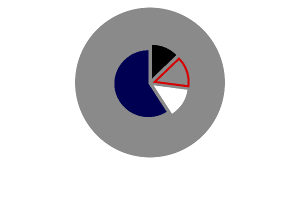
Representative democracy. Practical but detached.
There is a curve of normal distribution - and the variety of intelligence quotients follow it as well. The majority is average, with poor brightness in general, mediocre skills, dangerously small capacity to see the ecosystem as a whole. The global warming calamity is just a natural result of an ethos of "people choosing the best for themselves". Laics unwilling to hear the right experts. Professionals focused on their area and favorite toys (computers, gadgets, cars, arts, abstract notions of nation) unable to feel the whole. Majority lacking insight pulling the minority to the abyss.
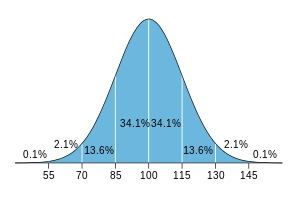
This is human society. Equality and headcount.
The strength of the average ones is overwhelming.
Democracy is often called the tyranny of majority. If the majority is middle-class, suburban, moralist, prudish, bigot, intolerant, under-educated with mediocre taste - they decide the governors and the laws and the grants for the rest. The laics are vulnerable to manipulation through advertisement techniques employed by experts in the area - so the electors can hardly choose by the reason. That is the basic justification for frequent takeovers - by army, businessmen or leaders of whatever kind. The cynic would say, that the experts, bureaucrats, enterpreneurs rule in the backstage anyways, the elections are a theater and the representatives have to assemble and consult the experts at the end. The presidents and ministers are the faces that change, the doers remain. In that sense, there is a fragile balance between embedded class (stability, non-flexibility) and electees (innovation, irrationality).
Representative democracy in the most benign case presents a horizontal system. A worker, farmer, doctor, teacher, artist, soldier, lawyer or member of parliament (and government) are equal under the law. Their individual contribution to the economy varies - as much as their salary does - but in civilian life they do not stand one above another. Everyone is specializing in his field, governing and coordination is just another necessary role, standing among the others. Some would say that it is human natural inclination towards hierarchy, some would object that it is the centuries of conditioning in the feudal mindset, some would note that the governor’s excessive power corrupts - but at the end the representants of the electorate often climb up above the rest of the folk, securing their untouchability through the other specializations originally intended to be horizontal. The pyramid returns.
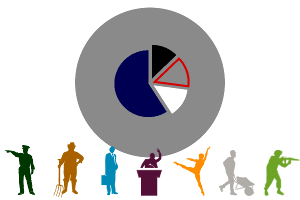
Horizontal system:
Everyone serves his function. Everyone equal.
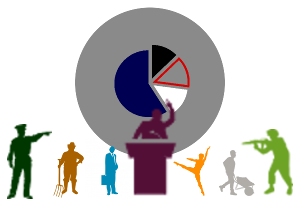
The trouble with vested power.
The governors and the eforcers get the guns.
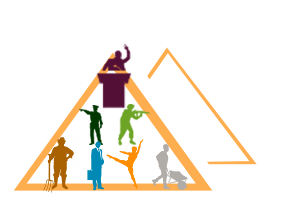
And we are back where we were: Hierarchy
based on functions, that were not meant to be vertical
Illiberalism - democracy of mob with holy book, supreme leader and censorship
The point of any government, democratic or feudal, is to fix problems, set precautionary rules for next time and in general - make everyone feel secure and satisfied. Doing something useful and welcome is looked at with suspicion - by the intellectuals in democracy. It is not easy to distinguish serving public, doing public good - and populism. When does it become harvesting of the popular sentiments - including phobias, prejudices or small-town moralism? As the representative democracies degenerate into cynical split between ruling elites and the folk expected to cast a ballot with no impact on the next term’s policies - a call for accountability, reviving of the "original idea" of the democracy (if there was any), grassroot movements - come into play. Some of the competitors in the ruling class harvest these sentiments and promise an establishment of a governement of mob - the original take on democracy as the tyranny of majority - the average, the mediocre, the unrefined. This threatens to pull down those more erudite, skilled, insightful and libertarian into the cage of artificial conservativism.

Tyrany of majority ...

... resembles rule of the pyramid.
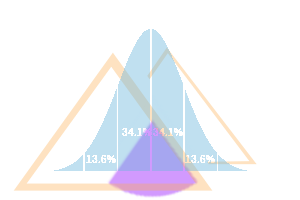
Who is the majority?
Of course, most of these flavors of democracy fail due to their inherent systemic bugs. Democracy is not a solution, not a functional mechanism, it is one possible skin on the complex machine of society - specializations, production, competition, trade, innovation. Its main problem - the plebiscite lacking education, skills and overview is either deciding, or electing those who will decide - persists. Thanks to general self-confidence, negative outcomes of wrongly invested trust and wrong decisions are never the responsibility of the mob, but the failure of their scapegoat proxies. Electorate’s inability to admit mistakes in choices and overall lack of capacity to do the qualified decisions - preconditions disillusionment - and even worse choice of strong leaders that claim to fix it all. Their "qualifying" trait is pampering mob’s ego: "you are right, we will give you what you demand, at last."
After long lasting illiberal electoral systems like islamic republic in Iran or the proceedingly embedden regime of Putin’s Russia and even Xi’s recent overtake of China - new ones pop up around the world - PiS in Poland, Orban in Hungary, Salvini in Italy, FPÖ/ÖVP government in Austria, Bolsonaro in Brasil, Duterte in Philipines. All of them align with Iran-Russia-China model, seek closer cooperation with them and support from them, as they are the ones who emanate the example. Their common trait is holding a "democratic" elections of the cadidates selected by totalitarian supervisor. Electorate relies on a strong leader reminiscent of ancient monarch as much as the modern history’s totalitarian leaders.
These modern monarchs - characteristically - nurture artificial values from the 19th century (selfish patriotism, sanctified nation, spheres of influence, territoriality, imperialism) and invoke even older (state religion, traditional morals, laws of nature) that are still resonating with the habits and intelligence of the average population. The new regimes are a blend of social conservativism (feudalism), strong state (socialism), and ruthless market economy (capitalism) with emphasis on bureaucracy, monopoly, corporativism. They are socialist in bad sense, they are right-wing in the bad sense. Ruling elite harvests nationalism and protectivism as much as global economy when convenient. Fake moralism white-washes the maffia businessman nature of the oligarchs. It is democracy of the mob, dictatorship of majority - that elects its leaders that in turn filter the information and shape its opinions and choices. The worst of everything that this world has tried so far.
Repainting
The ancient and feudal hierarchy had two different implementations. Self-indulgent alpha who uses the well-treated armed caste to subdue the malnoursished and impovershied majority. A pyramid of hierarchically understood roles that serve each-other mutually. A smiliar polarity of bright side and shade appear in democracy. Either the free citizens choose their skilled coordinators and representatives to fulfill this functional need for them, or the dumb mass chooses strong leaders with characteristics that their lack of knowledge conditions them to value. The hybrid right-wing populist system, bureaucratic welfare state with corporate capitalism and maffia running it all, nationalism and moralist conservativism entertaining the masses - tries to balance in between. As a history has proven, mob’s shortsighted wisdom and prejudice against dissent prevent the innovation that occurs in diversity-cherishing ecosystems. Even worse, it is deaf towards the feedback - that can signal the imminent catastrophy.
The feudal, democratic or mobo-cratic and totalitarian fasade shapeshifts. Apparently, as the framing of the systems changes, its constituent groups remain - and reveal the unchanging core of society. The inadequate elites that take pleasure in ruling and the benefits it brings. Delusional brain. The mass that likes to follow and welcomes if someone else is deciding and taking responsibility but simultanously loves being told that it is intelligent. Passive aggressive muscles. The thugs who like to fight, enforce, bully, torture, compete, win and soak in glory. Neurotic nervous system. Specialists with their narrowly focused occupations, playing with their toys. Vital organs not concerned about the greater picture. Where does the wisdom, sanity checks and improvements come from - in this organism? Is it a body of suicidal smoker, extreme sport fan, village idiot?
Improvement and deterioration of democracy
If tyranny of majority (especially of the average and mob) happens, it does not seem to be the desired significant upgrade from the plain totality. A false dilemma is presented - either the majority has the power (democracy, whatever flavor) or the minority oppresses the rest (totality, whatever flavor). Good or evil. With regard to all that has been said - this is too simplistic perspective. Totalitarian system is usually tailored to the average taste and so it always relies on the complacency of majority. Average procreative families, with average prefabricated values (patriotism, nationalism, normality). Same as in vulgar democracy.
Democracy, in western intellectual understanding, is not just a tyranny of majority, nor a rule of mob. It is a democracy with flavor - a liberal one. We could dispute what the liberal label defines, but generally, the majority decides on the matters that directly influence it, they do not vote on the minority rights - it’s just not considered appropriate. A space is left for privacy, individual lifestyles, dignity in otherness. The minority opinions are allowed, heard and not punished. In better cases, they influence the decisions. At least, they serve as a critical voice, a feedback, lack of which is a suicidal feature of all the known forms of totalitarian governements.
Mature democracy relies on well informed (educated) electorate that can make the wise decisions or at least choose its representatives, the best among the best. An expectation of the representatives to consult the experts before making the decisions - and not just the current public opinion polls. To rule based on the quite up-to-date scientific information, not the outdated popular beliefs and morals from the last century. This somewhat outlines a society putting the emphasis on progressive education, holding it as its ethos, a benign pressure against each individual to seek insight. A lighter aproximations is delegating this intention to the caste of the proxies - mediating between the wise of the society (scientists) and the mass (laics) - the mass media. What happens at the break of millenia is that the media is taken over by the average (content viewers), while the representatives submit to the majority prejudices (content electorate) - that ensures revenues and reelection - completely abandoning the line of being at least one step ahead of the average. Mature democracy gave in to the mob, informed expertise overrun by the fashion/fetish/idolation of the numerical majority. In this regard, not devising appropriate emergency breaks, democracy appears suicidal.
Consensus and consent - the tribal technique
Contrary to pupular beliefs, the systems that would overcome basic pitfalls of democracy have been devised, tested and used. Native american tribal societies used a consesus-building processes. Its implementation was traditionally circular - a shape not only energetically balanced from physical perspective (think stars and planets) but also emphasizing equality (equidistant position to the center) and importance of each voice (only in a circle one can see everyone present). A talking stick passed through the circle, person by person, each one holding it could speak until he passed it on. This way, no direct confrontations stole the group’s time nor the energy. The silent voices got to speak as well, unlike in pop-corn style free discussions.

Consensus - preconditions: Diversity welcome.
Circle: equal voice, no one left out.
Transparency: everyone sees everyone

Reaching consensus: Talking stick principle.
A lesson in patience and listening to the others.
No battle for speaking time, no interruptions, no takeovers.

Consensus is a state, when everyone agrees.
The whole community is moved by the same intention.
A solution designed not to harm or exclude anyone.
The stick passed around so many times, the solution was adjusted to suit also the minority concerns, until a decision that everyone present would agree with was produced. The outcome of such process - consensus - featured something that most of the systems lack: robustness. A solution that everyone agrees with does not invite discord, bitterness or sabotage. The collective could implement it relying on general support. There was no majority oppressing the minority. There was no disdain for dissent, it was not just tolerated - the spirit of the society was to welcome it, include it and work with it. At the end, this produced better solutions. Because the minority report might be from an expert, a crucial dissenter, a helpful critique - that the "mob" was obliged to hear and accommodate.
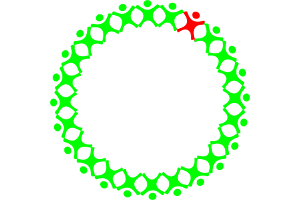
Dissent: An individual diagrees.
A community is willing to hear his concern,
and find a solution that includes his good.

Consensus: A solution is good for everyone.
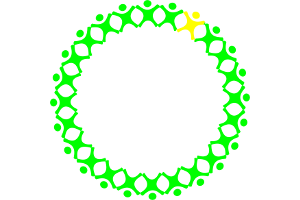
Consent: Everyone feels its safe to try the solution.
Some are happy about it. Some are not.
But everyone can at least live with this.
Of course, this was time-consuming practice, applicable preferably in small groups. A representative variant seems convenient, with a risk of representative caste coming slightly apart from their electors - as in any other system. Consensus is an idealist state in regard of "everyone ethusiast with the final solution". As a modern practical approximation, group can seek at least a consent. This means "being able to live with the solution" - though still expressed by everyone present in the voting. The consent building process is very similar to consensus seeking, all the minority voices are heard - in circular, non-disruptive, non-combative way - and contribute to the shape and shade of the decision.

Building consensus or acquiring consent:

Going in rounds and adjusting the solution,

until everyone is convinced that this is good.
One of the well-known and tried consent-building models is called Sociocracy. It tries to establish a middle ground between the best intentions of consensus circle and practical limitations. There is limited number of rounds that the topic circulates for. A round in which everyone just acknowledges if they understand the concern or proposal, the round of comments, a solution building and then the round of reach consent. Can you live with the solution, or you have an paramount objection. This institute is precisely defined as solution that would harm individuals in the community, contradict the basic foundation of the community or make someone leave the community. This way the decision-makers can abstract from surface and the details towards what really matters - which is clearly defined.
And the winner is ...
Simplicity-fetishists and simple-minds may ask which of these systems is the best. The question itself has no relevance. One of the pitfalls of human societies was the winner/looser perspective. Choosing the right one over the wrong ones is a mistake - since there is no right or wrong - each of the suggested solutions has it pros, cons, benefits and dangers. Most of them were tried and reproduced. The lesson for humankind lays in the acknowledgment of this history, in the awareness of this complexity. There is nothing more and nothing less expected of us - just living with this knowledge.
These are different visions and different models, there is no ideal one, they are differently suitable to different situations and scales. Some problems are better resolved via hierarchy (practical decisions), democracy (philosophical decisions) or consensus (small groups). Implementing each one of them requires working with their weak-spots, introducing necessary checks, balances and emergency breaks. We need to be aware of which one we intend to implement, which one is happening - and in what ways it can turn to something else.
On the largest - national and world scale - there are some trivial fact of the science: Hierarchies happen. Power exchange is reciprocical. Delegating responsibility means laying off freedom. The government of average does not benefit anyone. Though the trust and communication between elites and commoners is crucial. The rule of majority (direct or complacent) does not benefit anyone. The minority voices - the abnormal, odd, non-conformist identities - bring feedback, sanity checks, ideas, improvements, progress.






